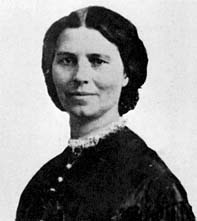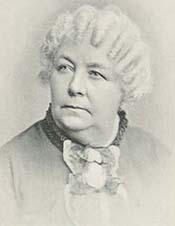Elizabeth Cady Stanton
 Perhaps
one of the most important figures in the women's suffrage movement of
the 19th century, Elizabeth Cady Stanton would play a very large role
in giving women many of the powers that are so easily taken for granted in today's
world. Born in Johnstown, New York in 1850, she was the eighth of eleven children
in her family. Unfortunately, only five would live to full adulthood, a tragedy
that had a very important impact of Elizabeth's early life.
Perhaps
one of the most important figures in the women's suffrage movement of
the 19th century, Elizabeth Cady Stanton would play a very large role
in giving women many of the powers that are so easily taken for granted in today's
world. Born in Johnstown, New York in 1850, she was the eighth of eleven children
in her family. Unfortunately, only five would live to full adulthood, a tragedy
that had a very important impact of Elizabeth's early life.
With a mourning mother who distanced herself from her family, Elizabeth spent much of her early life by her father's side, an attorney and eventual United States Congressman. It was during these years spent learning about the law with her father that Elizabeth began understanding the laws that limited almost every aspect of a married women's life, and planted the seeds of her eventual involvement in granting women the same rights they deserved.
Like most prominent women of her time, Elizabeth had the privilege of receiving a higher education then most were ever afforded. She would achieve academic status through winning awards and competing on the same level as her male peers. After her graduation from Johnston Academy, she would enroll in the Try Female Seminary, only because the other colleges of her day did not allow women students. It was here that Elizabeth first began dealing with the conflicting interests that surrounded her religious beliefs, and would eventually leave her to distance herself from Christianity.
Elizabeth had the opportunity to be at the forefront of the early abolitionist movement in the mid 1800s, just prior to the Civil War. Her cousin, Gerrit Smith, was part of the group led by Jim Brown that eventually held the famous raid in Harper's Ferry, VA. It was during her time spent with Smith where Elizabeth would meet Henry Stanton, also involved in the anti-slavery movement. Romance between the two blossomed, and the couple would marry in 1840. The two would honeymoon in Europe, attending the World-Anti Slavery convention where Henry was a delegate. There, while not allowed a seat in the convention, Elizabeth would meet Lucretia Mott, a Quaker teacher who played a joint role with Elizabeth in anti-slavery and Women's Rights organizations of there time.
After studying law for a brief periods with Elizabeth's father, Henry moved the family to Boston where he started his own law firm. This was a crucial time in Boston for anyone involved in both social progression movements, and Elizabeth would find herself smack dab in the middle of it all. However, it would be some time before Elizabeth would begin her own activism. The family would move back to the state of New York, where Elizabeth would mother four of her children. Her social interaction with the suffrage movement would take a back seat, but it wouldn't be long before she began laying the groundwork of her eventual success.
After years of personally witnessing sexual discrimination in every stage of her life, first from her father who never took her aspirations seriously, to the all male schools that she could not attend, and life as a secluded housewife, Elizabeth finally began organizing the first Women's Rights Convention with her friend Lucretia Mott in 1848. There she developed her Declaration of Sentiments, which outlined the rights that every women should be granted. The declaration would make Elizabeth a central figure in the women's suffrage movement, and she spoke shortly after at a second women's convention.
A few years later, Stanton would be introduced to Susan B. Anthony, who would be a integral partner to help push the movement to new frontiers. Anthony would complement Elizabeth's talents perfectly, being the organizer and speaker at the front lines of the battle. While they did differ on some of the goals of the movement, the relationship forged between the women would prove to be a formidable one-two punch. The two would stray from abolishonist related movements and eventually focus entirely on their own movement, heavily supporting the ratification of the 14th and 15th amendments, which dealt with equal rights and voting privileges respectively.
 In
1876, almost 30 years after the first Seneca Falls convention, stanton helped
write the Declaration of Rights of the Women of the United States,
which would be delivered by her cohort Anthony at the nation's centennial celebration
in Washington D.C. in 1876. Many of the early convention's attendees were there
to sign the declaration. Other work's followed with collaborations with both
Anthony and Matilda Joslynn Gage, who led the National Woman Suffrage Association
with Elizabeth. The Women's Bible and A History of Woman Suffrage would see
print, the latter which would see numerous volumes added covering the thirty
year long movement that the women were involved with.
In
1876, almost 30 years after the first Seneca Falls convention, stanton helped
write the Declaration of Rights of the Women of the United States,
which would be delivered by her cohort Anthony at the nation's centennial celebration
in Washington D.C. in 1876. Many of the early convention's attendees were there
to sign the declaration. Other work's followed with collaborations with both
Anthony and Matilda Joslynn Gage, who led the National Woman Suffrage Association
with Elizabeth. The Women's Bible and A History of Woman Suffrage would see
print, the latter which would see numerous volumes added covering the thirty
year long movement that the women were involved with.
Elizabeth Cady Stanton perhaps did more for women's rights than any other activist at this time. She didn't just call for giving women the right to vote, but did far more in letting women obtain control over every aspect of their lives. Concepts such as birth control, financial independence, and the right to have custody of children were just some of the principals Elizabeth stood for and played a large part in her drive to achieve a victory for women's rights. She often referred to her "planning" of each of her children, noting that a women should have full decision making responsibilities for both her sexuality and in having children. She also famously vowed not to speak the words "obey" in her wedding vows, and chose to keep her maiden name in addition to taking her husband's name as a sign that she would not let herself be owned by another man.
Although she did not live to see the day (much like her contemporaries), Elizabeth Cady Stanton's devotion to the women's suffrage movement ultimately led to the 19th Amendment of the United States in 1920, which finally granted women the right to vote. Over time her actions slowly became realized, and to this day the women's rights movement owes much to the contributions Stanton gave over her lifetime,









